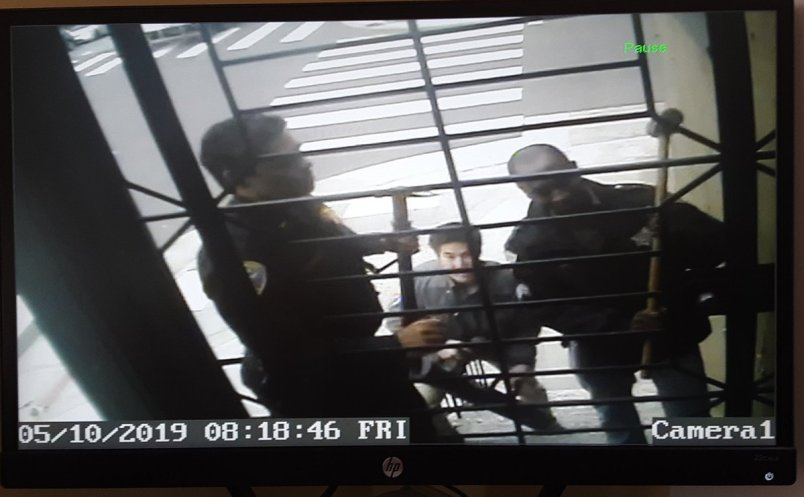Bryan Carmody was wrenched from a dead sleep the morning of May 11 by a rhythmic pounding coming from the front of his house.
Groggy, the Bay Area-based journalist tumbled out of bed to check his home surveillance footage. There, in pixelated black and white, he saw a group of decorated police officers, one of whom was going to town on his wrought-iron gate with a sledgehammer.
“That gate is something I’ve had problems with for 20 years,” Carmody grumbled in an interview with TPM. “The amount of locksmiths I’ve hired, it’s been such a hassle. So I ran over to the window and yelled down ‘please stop what you’re doing, I’ll let you in.’”
Bewildered, he hustled downstairs.
“The first guy through the door handcuffed me.”
Two weeks ago, the notion of being bound and watching his possessions rifled through and confiscated by the police was a far cry from Carmody’s reality.
A longtime freelancer, Carmody brushed shoulders with the local police all the time, forming a copacetic relationship with the boys in blue.
But everything changed after the death of San Francisco public defender Jeff Adachi.
Adachi, an elected official who made his name by cracking down on police misconduct, died suddenly at age 59 in late February. The local press corps swarmed for information.
“I mostly cover homicides and rescues and fires,” Carmody said, explaining the first hours after Adachi’s death. “If you’ve been at a thousand fires in 30 years on the job, stuff that’s different stands out.”
He described the strange lack of information about Adachi’s death, the withholding of very basic details like where he was when he died.
“When this information started coming in weirdly all of our spidey senses just started going off,” he said of other local reporters. “Then all these wild rumors started flying.”
The rumors included whispers of drug involvement, of a prostitute, of a rented apartment littered with empty alcohol bottles and a mussed bed.
But when Carmody got his hands on the official police report, he was underwhelmed.
“Meh,” he said.
The report detailed cannabis gummy bears (legal in California) and a few bottles of alcohol in the recycling bin — a far cry from the den of iniquity being churned through the rumor mill.
“I took possession of this thing and did my reporting,” Carmody said. “I reject, by the way, the characterization that I was running around trying to sell the police report. I had worked for over 24 hours when my story was put on three local affiliate news networks in California.”
The story hit TV screens and caused an uproar. Adachi’s allies accused the police of trying to land one last smear on the public defender who was such a thorn in their side in life. City councilmen upbraided the department for allowing the report to be leaked, saying it “eroded public trust” in the institution. Police promised an internal probe and investigation for any criminal misconduct.
Carmody thought, after a harried and high-energy 24 hours, that his part in the action was done. Then the police came knocking.
“Fast forward to April 11,” he recalled. “It was the first day of the Masters golf tournament.”
Two police officers, one of whom Carmody knew fairly well, stopped by for a chat.
“I let them into my home and invited them into the living room,” he said. “We sat down they asked to reveal my source. I did not. We shook hands and parted ways.”
Weeks of silence followed, until the crash of a sledgehammer shattered the 8 a.m. quiet.
While Carmody stood handcuffed in the hallway, the police spread out, shouting “police department, search warrant!” he recalled, as he watched them clear his home, room by room, at gunpoint.
The police maintain that they were carrying out their duty. “The citizens and leaders of the City of San Francisco have demanded a complete and thorough investigation into this leak, and this action represents a step in the process of investigating a potential case of obstruction of justice along with the illegal distribution of confidential police material,” said spokesperson officer Adam Lobsinger.
Carmody said that he watched them, with his hands behind his back, as they rifled through all of his possessions.
“They looked through every file folder,” he said. “I’m talking ones labeled ‘Christmas dinner recipes,’ ‘cat vet bills’ — every piece of paper they could find in house.”
“They even took an external phone charger battery,” he added, laughing. “The one guy said ‘looks like a hard drive to me.’ I’m like, ‘dude it’s a battery.’”
Carmody said that two FBI agents — “snappy dressers” — joined the fray, dragging in chairs from the dining room table and questioning him in his home office. When he wouldn’t reveal his source to them either, they left.
The police took control again, transporting Carmody to his office where they seized all of his electronics and the original police report from his safe.
“Six-plus hours into the ordeal they had gotten everything,” he said. “Every computer out of my office, every family photo on my digital camera and pictures of deceased family members, deceased pets, every vacation me and my fiancée ever took in 10 years. Just imagine them taking every computer you have. I have nothing left in my office, there’s no landline anymore, I have no computer — I can’t even call for a cab.”
He said his first stop after the raid was the Verizon store, for a replacement cell phone.
Carmody still doesn’t understand why he was the victim of such an intense raid. He says he wasn’t the only journalist in possession of the police report, and that the judge’s reasoning for signing the search warrant is still under seal. He’s lawyered up, in light of the drastic turn his life has taken.
“I’m a self employed guy and it’s crazy to say this, but I have a very good legal team,” he said. He added that they haven’t even begun to mull a lawsuit — for now, he just wants his stuff back.
“I’m a little sore, I’m a little bit butt-hurt, but that’s basically it,” he said. “I need to get my business up and running. I’ve missed huge stories already.”
“I just really don’t know what I do now.”










